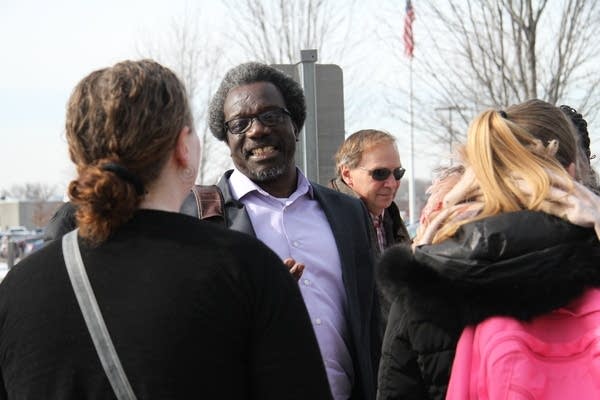Augsburg professor won't be deported, for now

Go Deeper.
Create an account or log in to save stories.
Like this?
Thanks for liking this story! We have added it to a list of your favorite stories.
Just in time for the start of the semester, an Augsburg professor will be able to teach African-American literature and postcolonial fiction, now that he's been granted temporary relief from deportation back to Kenya.
Mzenga Wanyama, 60, has been working at Augsburg for the past 13 years. He's been living in the United States since 1991.
Wanyama moved from Kenya on a student visa. He attended Howard University in Washington, D.C. and the University of Minnesota.
After his visa expired, he applied for asylum. But the immigration court, the Board of Immigration Appeals (BIA) and the 8th U.S. Circuit Court of Appeals ruled against him.
Turn Up Your Support
MPR News helps you turn down the noise and build shared understanding. Turn up your support for this public resource and keep trusted journalism accessible to all.
"The only thing we knew is we didn't want to go where they wanted us to go because the fact that the judge ruled against us doesn't necessarily mean we didn't have a case," Wanyama said. "We just did not persuade or convince the judge to see it from our perspective."
Wanyama and his wife, Mary, have been living in the United States under prosecutorial discretion by Immigration and Customs Enforcement (ICE), which requires him to check in monthly.
But in March, ICE summoned the professor and told him to prepare to leave the country. Since then, the agency has changed his departure deadline, keeping him uncertain about whether he could start teaching this fall.
Meanwhile, his attorneys have been arguing his case in the courts. U.S. Senators Amy Klobuchar and Tina Smith are working to find him a path to citizenship. Minneapolis Mayor Jacob Frey has said "no president, no federal agency will deport Dr. Wanyama without a fight from me."
On Friday, Aug. 31, the BIA granted Wanyama an emergency stay of removal, which gives him more time to reopen his asylum case.
"It's still an uphill battle in terms of whether or not the Board of Immigration Appeals will reopen the case," said Katheryn Wasylik, one of his attorneys. "It's a very high burden that we have to meet."
But she added that his attorneys have presented new evidence, concerning his asylum application, that was not available when his previous cases were denied. She declined to elaborate, citing security concerns.
Wanyama is still required to check in with ICE. However, he will not need to attend those meetings with travel documents in hand.
It could take several months for the BIA to make a decision on his case. If it agrees to reopen the case, Wanyama's asylum claim would start over at the local immigration court in Bloomington.


